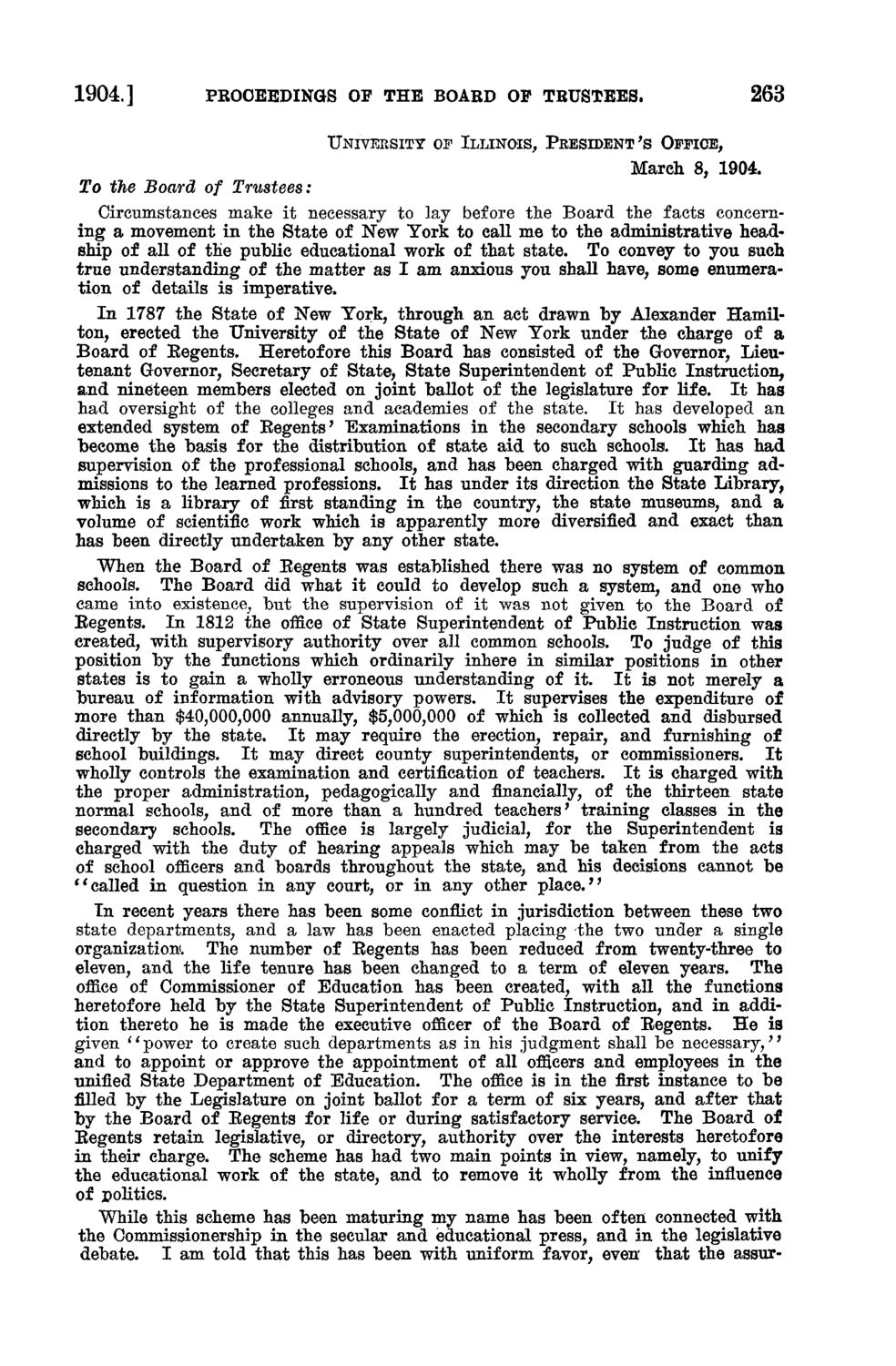| |
| |
Caption: Board of Trustees Minutes - 1904
This is a reduced-resolution page image for fast online browsing.

EXTRACTED TEXT FROM PAGE:
1904,] PROCEEDINGS OP THE BOARD OP TRUSTEES. UNIVERSITY OF ILLINOIS, P R E S I D E N T ' S OFFICE, 263 March 8, 1904. To the Board of Trustees: Circumstances make it necessary to lay before the Board the facts concerning a movement in the State of New York to call me to the administrative headship of all of the public educational work of that state. To convey to you such true understanding of the matter as I am anxious you shall have, some enumeration of details is imperative. I n 1787 the State of New York, through an act drawn by Alexander Hamilton, erected the University of the State of New York under the charge of a Board of Regents. Heretofore this Board has consisted of the Governor, Lieutenant Governor, Secretary of State, State Superintendent of Public Instruction, and nineteen members elected on joint ballot of the legislature for life. I t has had oversight of the colleges and academies of the state. I t has developed an extended system of Regents' Examinations in the secondary schools which has become the basis for the distribution of state aid to such schools!. I t has had supervision of the professional schools, and has been charged with guarding admissions to the learned professions. I t has under its direction the State Library, which is a library of first standing in the country, the state museums, and a volume of scientific work which is apparently more diversified and exact than has been directly undertaken by any other state. When the Board of Regents was established there was no system of common schools. The Board did what i t could to develop such a system, and one who came into existence, but the supervision of it was not given to the Board of Regents. I n 1812 the office of State Superintendent of Public Instruction was created, with supervisory authority over all common schools. To judge of this position by the functions which ordinarily inhere in similar positions in other states is to gain a wholly erroneous understanding of it. I t is not merely a bureau of information with advisory powers. I t supervises the expenditure of more than $40,000,000 annually, $5,000,000 of which is collected and disbursed directly by the state. I t may require the erection, repair, and furnishing of school buildings. I t may direct county superintendents, or commissioners. I t wholly controls the examination and certification of teachers. I t is charged with the proper administration, pedagogically and financially, of the thirteen state normal schools, and of more than a hundred teachers' training classes in the secondary schools. The office is largely judicial, for the Superintendent is charged with the duty of hearing appeals which may be taken from the acts of school officers and boards throughout the state, and his decisions cannot be " c a l l e d in question in any court, or in any other p l a c e . ' ' I n recent years there has been some conflict in jurisdiction between these two state departments, and a law has been enacted placing the two under a single organization. The number of Regents has been reduced from twenty-three to eleven, and the life tenure has been changed to a term of eleven years. The office of Commissioner of Education has been created, with all the functions heretofore held by the State Superintendent of Public Instruction, and in addition thereto he is made the executive officer of the Board of Regents. H e is given " p o w e r to create such departments as in his judgment shall be necessary," and to appoint or approve the appointment of all ofitcers and employees in the unified State Department of Education. The office is in the first instance to be filled by the Legislature on joint ballot for a term of six years, and after that by the Board of Regents for life or during satisfactory service. The Board of Regents retain legislative, or directory, authority over the interests heretofore in their charge. The scheme has had two main points in view, namely, to unify the educational work of the state, and to remove it wholly from the influence of politics. While this scheme has been maturing my name has been often connected with the Commissionership in the secular and educational press, and in the legislative debate. I am told that this has been with uniform favor, even that the assur-
| |